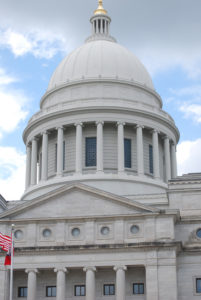 By Steve Brawner, © 2019 by Steve Brawner Communications, Inc.
By Steve Brawner, © 2019 by Steve Brawner Communications, Inc.
In politics, is an ounce of prevention worth a pound of cure? Or if it isn’t broken, don’t fix it?
With one bill dealing with illegal immigration, Arkansas lawmakers went with the first adage, despite Gov. Asa Hutchinson’s concerns.
On the day the Legislature recessed April 10, the House voted to ban Arkansas municipalities from adopting “sanctuary city” policies.
Act 1076 by Sen. Gary Stubblefield, R-Branch, is a response to some cities like Los Angeles and Chicago that have declared themselves sanctuary cities for illegal immigrants.
“Sanctuary cities” is a political term, not a precise legal one, but this bill does describe the policies it seeks to counteract. Among its provisions are these: Cities could not limit municipal employees and officials from cooperating with federal immigration agencies such as Immigration and Customs Enforcement. They also could not grant to illegal immigrants the right to a lawful presence.
No Arkansas cities have enacted sanctuary policies, so lawmakers are using an “ounce of prevention” to fix something that’s not broken.
The concern is, you might break something else. The bill also says cities cannot enact policies preventing law enforcement officers from asking anyone about their citizenship or immigration status.
Hutchinson told reporters in his office that day that the section could lead to racial profiling. Individual police officers could demand papers simply because someone looks Hispanic, and cities couldn’t enact policies that would keep them from doing that.
Hutchinson said he wouldn’t veto the bill because he supports the other parts requiring cooperation with the federal government, and Stubblefield has assured him he will seek to address the racial profiling concerns in the next available legislative session. That might be two years from now.
Part of Hutchinson’s calculus must be that under the Arkansas Constitution, legislators can override a governor’s veto with a simple majority – the same percentage that passed the bill in the first place. (Congress must muster a two-thirds majority to override a presidential veto.) The bill passed 71-24 in the House and 24-5 in the Senate.
A veto is not irrelevant because it can call attention to a completely unacceptable bill that slips through the process. But governors must use it sparingly, and Hutchinson probably won’t use it at all this session.
Moreover, it would be tough for Republican legislators and a Republican governor to oppose anti-sanctuary city policies in a political environment where the Republican president, who’s very popular with Republican voters, is tweeting that the feds should send all illegal immigrants to sanctuary cities.
Hutchinson announced his decision to sign the bill in his office moments after publicly signing two bills cheered by immigration activists. Act 844 by Rep. Dan Douglas, R-Bentonville, allows state colleges and universities to charge in-state tuition rates to participants in the Deferred Action for Childhood Arrivals program. DACA protects from deportation qualifying young immigrants brought to America illegally by their parents. It was created by an executive order by President Obama. Another bill, Act 837 by Rep. Megan Godfrey, D-Springdale, lets DACA participants earn a nursing license.
Again, those are coming from a Legislature where three-fourths are members of President Trump’s party.
The activists on hand for the bill signings – they brought the governor tacos – were disappointed he did not announce a veto. Instead, he simply told them he didn’t “want anything to overshadow the good news.” Mireya Reith, founding executive director of the immigrants rights group Arkansans United, later said members of her community have been asking if it is safe to leave the house.
So to sum it up: Arkansas lawmakers passed two bills to help young people integrate into a society that still says they’re here illegally, and another to require Arkansas cities to continue working with the feds to round up illegal immigrants.
Something definitely is broken, on a nationwide scale. But ultimately only Congress and the president can fix it.